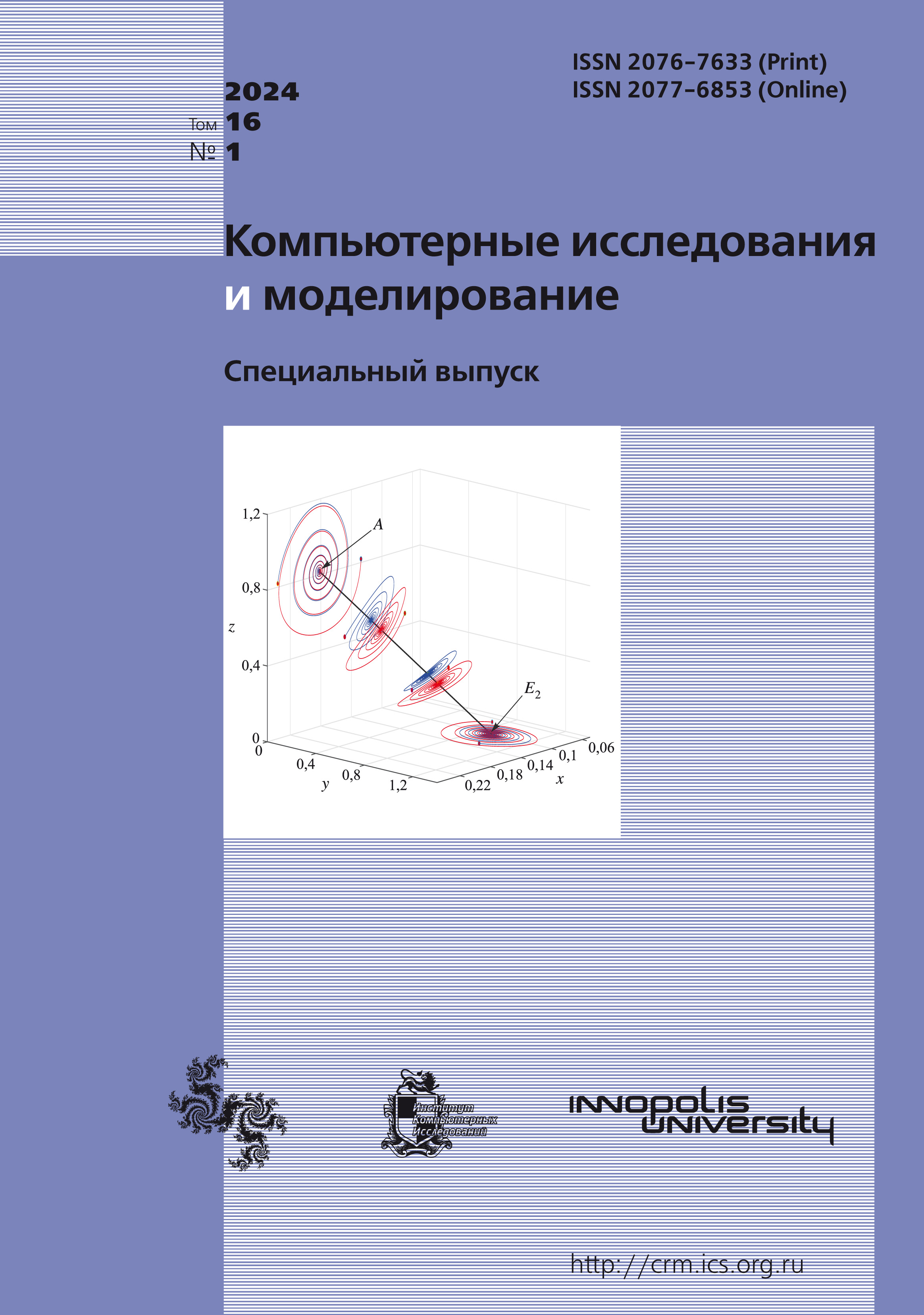All issues
- 2024 Vol. 16
- Issue 1 (special issue)
- 2023 Vol. 15
- 2022 Vol. 14
- 2021 Vol. 13
- 2020 Vol. 12
- 2019 Vol. 11
- 2018 Vol. 10
- 2017 Vol. 9
- 2016 Vol. 8
- 2015 Vol. 7
- 2014 Vol. 6
- 2013 Vol. 5
- 2012 Vol. 4
- 2011 Vol. 3
- 2010 Vol. 2
- 2009 Vol. 1
-
One method for minimization a convex Lipschitz-continuous function of two variables on a fixed square
Computer Research and Modeling, 2019, v. 11, no. 3, pp. 379-395Views (last year): 34.In the article we have obtained some estimates of the rate of convergence for the recently proposed by Yu. E.Nesterov method of minimization of a convex Lipschitz-continuous function of two variables on a square with a fixed side. The idea of the method is to divide the square into smaller parts and gradually remove them so that in the remaining sufficiently small part. The method consists in solving auxiliary problems of one-dimensional minimization along the separating segments and does not imply the calculation of the exact value of the gradient of the objective functional. The main result of the paper is proved in the class of smooth convex functions having a Lipschitz-continuous gradient. Moreover, it is noted that the property of Lipschitzcontinuity for gradient is sufficient to require not on the whole square, but only on some segments. It is shown that the method can work in the presence of errors in solving auxiliary one-dimensional problems, as well as in calculating the direction of gradients. Also we describe the situation when it is possible to neglect or reduce the time spent on solving auxiliary one-dimensional problems. For some examples, experiments have demonstrated that the method can work effectively on some classes of non-smooth functions. In this case, an example of a simple non-smooth function is constructed, for which, if the subgradient is chosen incorrectly, even if the auxiliary one-dimensional problem is exactly solved, the convergence property of the method may not hold. Experiments have shown that the method under consideration can achieve the desired accuracy of solving the problem in less time than the other methods (gradient descent and ellipsoid method) considered. Partially, it is noted that with an increase in the accuracy of the desired solution, the operating time for the Yu. E. Nesterov’s method can grow slower than the time of the ellipsoid method.
-
Ellipsoid method for convex stochastic optimization in small dimension
Computer Research and Modeling, 2021, v. 13, no. 6, pp. 1137-1147The article considers minimization of the expectation of convex function. Problems of this type often arise in machine learning and a variety of other applications. In practice, stochastic gradient descent (SGD) and similar procedures are usually used to solve such problems. We propose to use the ellipsoid method with mini-batching, which converges linearly and can be more efficient than SGD for a class of problems. This is verified by our experiments, which are publicly available. The algorithm does not require neither smoothness nor strong convexity of the objective to achieve linear convergence. Thus, its complexity does not depend on the conditional number of the problem. We prove that the method arrives at an approximate solution with given probability when using mini-batches of size proportional to the desired accuracy to the power −2. This enables efficient parallel execution of the algorithm, whereas possibilities for batch parallelization of SGD are rather limited. Despite fast convergence, ellipsoid method can result in a greater total number of calls to oracle than SGD, which works decently with small batches. Complexity is quadratic in dimension of the problem, hence the method is suitable for relatively small dimensionalities.
-
Adaptive first-order methods for relatively strongly convex optimization problems
Computer Research and Modeling, 2022, v. 14, no. 2, pp. 445-472The article is devoted to first-order adaptive methods for optimization problems with relatively strongly convex functionals. The concept of relatively strong convexity significantly extends the classical concept of convexity by replacing the Euclidean norm in the definition by the distance in a more general sense (more precisely, by Bregman’s divergence). An important feature of the considered classes of problems is the reduced requirements concerting the level of smoothness of objective functionals. More precisely, we consider relatively smooth and relatively Lipschitz-continuous objective functionals, which allows us to apply the proposed techniques for solving many applied problems, such as the intersection of the ellipsoids problem (IEP), the Support Vector Machine (SVM) for a binary classification problem, etc. If the objective functional is convex, the condition of relatively strong convexity can be satisfied using the problem regularization. In this work, we propose adaptive gradient-type methods for optimization problems with relatively strongly convex and relatively Lipschitzcontinuous functionals for the first time. Further, we propose universal methods for relatively strongly convex optimization problems. This technique is based on introducing an artificial inaccuracy into the optimization model, so the proposed methods can be applied both to the case of relatively smooth and relatively Lipschitz-continuous functionals. Additionally, we demonstrate the optimality of the proposed universal gradient-type methods up to the multiplication by a constant for both classes of relatively strongly convex problems. Also, we show how to apply the technique of restarts of the mirror descent algorithm to solve relatively Lipschitz-continuous optimization problems. Moreover, we prove the optimal estimate of the rate of convergence of such a technique. Also, we present the results of numerical experiments to compare the performance of the proposed methods.
Indexed in Scopus
Full-text version of the journal is also available on the web site of the scientific electronic library eLIBRARY.RU
The journal is included in the Russian Science Citation Index
The journal is included in the RSCI
International Interdisciplinary Conference "Mathematics. Computing. Education"





